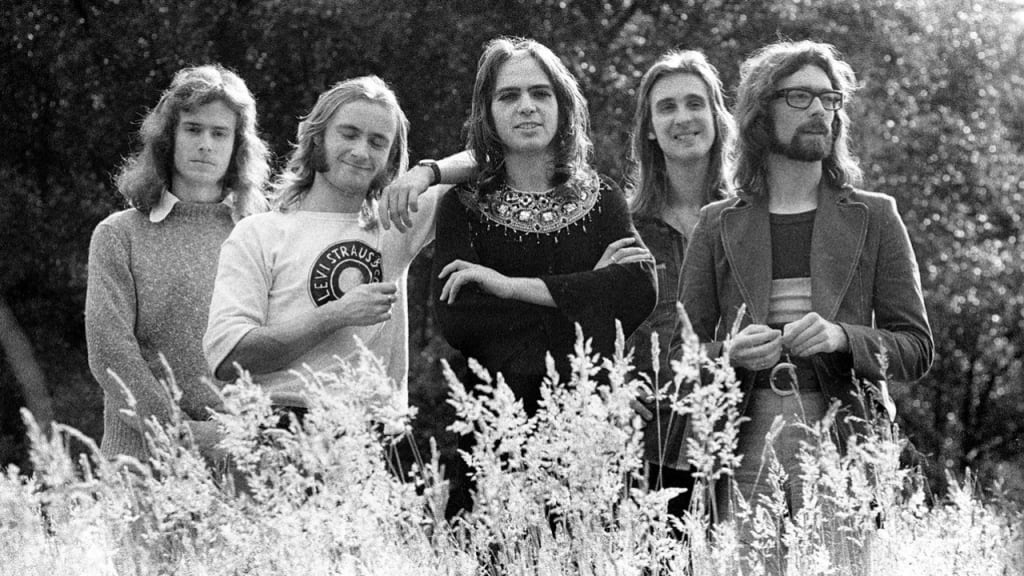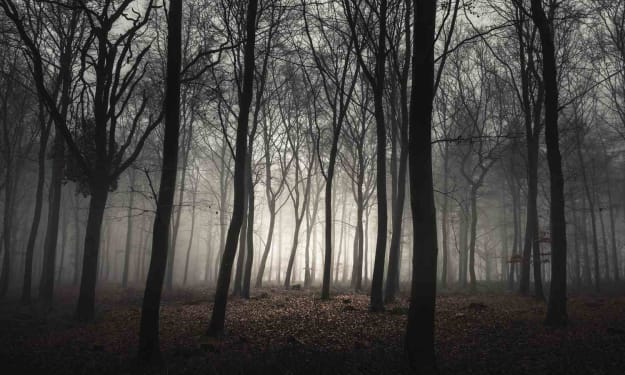9 Best Peter Gabriel-Era Genesis Songs
Songs from an often eclipsed era

Sadly, there exists some--in fact, I would say, many--people who believe Peter Gabriel just materialized out of thin air in 1987 to create So, and hasn't done anything of merit before or after. There are actually quite a few people who aren't aware the band Genesis was fronted by him, before Phil Collins took the band in a more mainstream direction.
Truth is, Peter Gabriel was there from the band's embryonic stage, and earned them a pretty modest cult following in their early years; grabbing the music press's attention with his avant-garde costuming and charismatic stage presence. While I won't open the can of worms that is "DID PHIL COLLINS RUIN GENESIS???"--I will say that the music from this era of the band is a far cry from what you hear of Genesis on the radio--but in the best way possible.
If you are reading this, you are probably a) aware of this, and are curious what I am going to pick as the best Peter Gabriel era Genesis songs, or b) not aware of this but are now curious! Well, if you belong to the latter group, let me be your guide into exploring some of the most epic, beautiful, and sometimes bizarre music that hailed from Peter Gabriel's Genesis.
So let's not waste any more time! Starting in chronological order, here are, in my own opinion, the best songs from Peter Gabriel era Genesis.
The Knife
The first defining song of early Genesis. The band's first album was full of idyllic, acoustic pieces. Most of their second album, Trespass, was much the same. However, the stand out song from the album is definitely "The Knife" which lives up to its name with its cutting sound and satirical lyrics that would become a trademark of Peter Gabriel's Genesis. Very uncharacteristic for Genesis at the time, "The Knife" is a rousing, epic tale of a violent uprising. Gabriel, a self-proclaimed lifelong pacifist who was influenced by the philosophy of Gandhi's peaceful protest, wanted to show in the lyrics how "all violent revolutions inevitably end up with a dictator in power." Thus, perpetuating a cycle of violence and oppression.
Genesis didn't necessarily "invent" progressive rock, as bands like King Crimson and Yes had already been making progressive rock at the time "The Knife" was released. However, "The Knife" did help lay groundwork for the new and exciting direction of Genesis, which was definitely its own unique flavor of prog.
The Musical Box
The first track on Nursery Cryme, the 1971 follow-up to Trespass, was "The Musical Box." And quite a rousing opener it was! The lyrics were based around a short story written by Gabriel, which was featured on the album's inside cover: In Victorian England a young girl accidentally beheads her friend while playing croquet. Shocked, she retreats inside and begins playing his musical box, which summons his ghost. His ghost returns to her in the form of an old man who has years and years of sexual repression behind him and he attempts to molest her. Her nanny hears her screams and throws the musical box at the ghost, destroying both the box and the spirit in the process.
Pretty wild, huh? The way the story is told through song is equally intriguing. Beginning slow and gentle, but then gradually building in intensity, we finish the song with Gabriel's voice verging on hoarseness as he--now playing the part of the perverted ghost--shouting his demands to a young girl. Watching any live performance of the song is also a trip, as Gabriel often used elaborate pantomimed gestures, and outrageous outfits. Most notable was when he, without notifying the band ahead of time, retreated from the stage during the musical interlude; and returned wearing his wife's red dress and a fox-head mask. The first time he did this was at a show in Ireland, in an extremely devout Catholic town. The reaction among the audience was stunned silence. But...It also did put Genesis on the front cover of Melody Maker, which helped launch their career.
Also worth noting, is that this song is the first in the Genesis catalog to feature Phil Collins on drums and background vocals. It's easy to miss though, as their voices actually sound eerily similar during this point in time.
The Fountain of Salmacis
Equal parts funky and hypnotic, "The Fountain of Salmacis" recounts Ovid's classical tale of a fountain, and its power to turn men effeminate. In the story, Hermaphroditus, a butch hunter God, son of Aphrodite and Hermes, happens across the fountain. Salmacis, the nymph presiding over the fountain, falls in love with him and prays that her body becomes combined with his. A God answers her prayers and merges them together--turning Hermaphroditus from male, to gender ambiguous.
The song seems to have somehow been buried under years of other Genesis songs stealing the spotlight, and is now usually only mentioned within the fan community. Among fans, it seems to be highly praised. Though why it's never reached quite the same attention as some other Gabriel-era Genesis songs--your guess is as good as mine.
Watcher of the Skies
This spacey opener to 1972's Foxtrot plays almost like a baroque period piece with its dramatic Mellotron intro; sounding almost somewhat like a church organ. Though as the intro continues, we hear rock seep in gradually, leading to a slow, but epic build up. Perfectly summing up the album as a whole, really. The lyrics were actually written by keyboardist Tony Banks, and bassist Mike Rutherford, in Naples while looking over the deserted landscape where they were rehearsing. (Hey, I never said all these songs were written solely by Gabriel, just that they were performed by him during his tenure with the band) The lyrics are from the point of view of an alien visitor coming to an empty Earth.
The song definitely lays a good soundscape for a desert land. The lyrics, though not Gabriel's, are still pretty thought-provoking. Imagine being an alien always hearing how vibrant Earth life is, and then coming to visit it only to discover it deserted because of war, famine, or other disasters. A solemn reminder of the way humanity will go if we don't change.
For live performances, Gabriel would wear UV face makeup with a rainbow cloak and bat wings on his head. The song was always an opener so the show could begin with only black lights highlighting Gabriel's eyes while the eerie organ filled the concert hall. The song was such a crowd-pleaser that it was performed, not only during the Foxtrot tour, but also during their 1973 and 1975 tour--and even two more tours after Gabriel left.
Supper's Ready
This prog song is so epic, that it makes all other prog songs look amateur in comparison. Don't just take my word for it though. The song reached #1 in Prog Magazine's latest reader's choice polls.
Though it has kind of a quirky name, "Supper's Ready" is actually a 23 minute epic journey of new age, occult, and religious symbolism--Beginning with a husband and wife sitting down to dinner, and ending with the Second Coming. It is in this song, especially, that Peter Gabriel proved himself as more than just a competent lyricist: He is actually a pure poet. The lyrics are a series of metaphors, analogies, and vivid imagery. Reportedly inspired by a combination of Pagan lore, the Book of Revelations, and--an odd experience in which Gabriel's wife was (allegedly) temporarily possessed during a late night conversation about the occult?
"Supper's Ready" isn't really a singular song, it's more of a suite made up of different movements. They all vary wildly in tone from slow and somber, intense and aggressive, and silly and quirky. It very well is like a piece of classical music, but with rock vocals, drums and guitar. It is also the song that highlights the best of each band members' musical ability. So while the song has a run-time that many non-"proggers" may find intimidating--I would honestly say it is the best song to start with when trying to get into Gabriel-era Genesis. The 23-minutes go by quickly, I promise!
I Know What I Like (In Your Wardrobe)
Definitely the most mainstream song to come out of Peter Gabriel's Genesis, "I Know What I Like" has an odd psychedelic flair that the band is not normally known for. (In fact, the song almost didn't get recorded because the band was worried it sounded too much like The Beatles.) However, the lyrics are exactly what you would expect from Gabriel: About a misfit drop out spending his time mowing lawns, being content with his life, but still being looked down on by the townspeople for not doing "something better" with his life.
Evolving from a free-form jam session, each band member had an equal part in the song's creation, though the lyrics are undoubtedly, 100% Gabriel's--a little bit quirky, a little bit profound; but all incredible.
This song was actually the only early Genesis song to reach the UK charts--odd, since progressive rock, as a general rule of thumb, tended to be more of a rebellion towards the mainstream music industry. But it was this song that definitely got more ears turned on to the sound of early Genesis.
The Battle of Epping Forest
Concerning a real life gang fight in London over turf, "The Battle of Epping Forest" is one of the most "fun" Genesis songs. It tells the story in a tongue-in-cheek way: Rich, socialites are lined up watching the working class lads duke it out over boundary rights, as if it is a spectator sport. The lyrics are performed in the way a sports announcer would talk about a game. Oh, and the barrage of different voices and accents that Gabriel puts on, add a level of Vaudevillian comedy.
Gabriel had actually intended on making the song as true to life as possible, trying to get information about the real people involved. But he had no such luck, so had to create fictional characters--something he was very good at doing. I joke often that I could see the song being turned into a short graphic novel. Though, Gabriel gives more personality to these characters in just under 12 minutes than some graphic novelists can give in 12 volumes.
Somehow, the whole band later expressed dissatisfaction with the song. Gabriel had felt the song's ending was too anti-climactic, while the rest of the band wasn't too keen on the music--so they reportedly made it difficult to perform so they wouldn't have to perform it live too often.
Despite their own personal qualms with the song, it's another fan favorite and definitely a fun sing-along.
In The Cage
In 1974, The Lamb Lies Down on Broadway was a lot more aggressive than anything out at the time--and definitely anything in the Genesis catalog. It's a surreal "hero's journey" type story about a New York City punk who is swept into another dimension and through a series of bizarre events, is forced to forgo his masculinity and get in touch with the sensitive side of himself that had been buried under years of societal expectations of manliness.
The whole air of the album is that of tension and confusion. But that feeling is hammered in hundred fold in "In The Cage": A repetitive riff that is pulsating, and the genuine terror and stress in the vocals make for a very uneasy atmosphere. It also has some interesting synth-work and vocal effects. Honestly, no description I can make of this song really does it justice. You kind of just have to listen to it and see what I mean.
The Carpet Crawlers
If you know one thing about Peter Gabriel, you know how absolutely unattached he gets to his own songs. In fact, once songs are no longer relevant to the current album he's promoting, he seems to forget about them entirely. The whole niche of his Back to Front Tour was "I'm going to play all this new stuff, and if you're nice, maybe I'll play the classics after that." He definitely prefers to look forward than moving backwards.
"The Carpet Crawlers" seems to be the only exception, however. In fact, it may be the one song of his career that he views as his "baby." Writing the entire song on the piano while visiting his in-laws, Gabriel seems to have a fondness for "The Carpet Crawlers" that he has with no other song of his.
His love for this song is not unwarranted. While The Lamb Lies Down on Broadway hosts some more bizarre, intense, and peculiar songs--"The Carpet Crawlers" acts as a surreal, but gentle intermission to the insanity. Peter's voice is gentle, almost lulling, and the catchy refrain of "We got to get in to get out" feels like a cult-like chant that can easily hypnotize the listener; making it also a perfect sing-along song. It's like a woozy, but oddly comforting dream that you don't want to wake up from.
About the Creator
Jennifer Childers
I just write thoughts on anime, games, music, movies, or other things that are on my mind. Occasionally a poem or short story might come up.






Comments
Jennifer Childers is not accepting comments at the moment
Want to show your support? Send them a one-off tip.